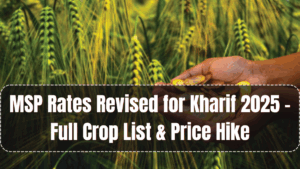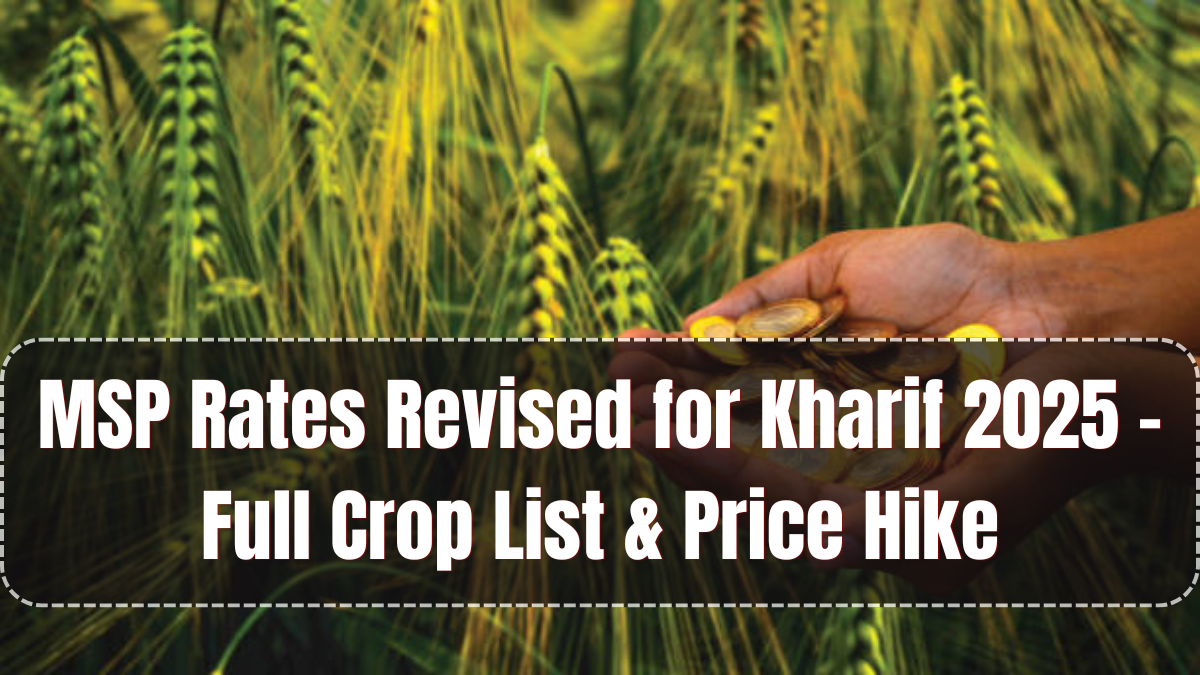The Union Cabinet, chaired by the Prime Minister, has announced a fresh revision in the Minimum Support Price (MSP) for Kharif 2025 crops, bringing much-needed relief and price assurance to farmers ahead of the sowing season. This annual update by the Commission for Agricultural Costs and Prices (CACP) ensures that farmers get fair compensation above their input costs and are encouraged to cultivate essential food crops.
With rising input costs, climate uncertainties, and market volatility, the revised MSP 2025 aims to safeguard farmer incomes and ensure continued food security across India.

Table of Contents
What Is MSP and Why Does It Matter?

The Minimum Support Price (MSP) is the rate at which the government purchases crops from farmers, ensuring they are not forced to sell at lower market prices during harvest season. MSP is especially vital for small and marginal farmers, who are most vulnerable to market fluctuations.
The MSP is declared for 23 crops annually, covering both Kharif (monsoon) and Rabi (winter) seasons. The Kharif MSP 2025 revision specifically applies to crops sown in June–July and harvested between September and November.
This year’s revision focuses on increasing support for key food grains, oilseeds, and pulses in line with India’s self-reliance and export goals.
Key Highlights of MSP 2025 Update
| Crop Category | Crop | MSP 2024 (₹/quintal) | MSP 2025 (₹/quintal) | Increase (₹) |
|---|---|---|---|---|
| Cereals | Paddy (Common) | ₹2,180 | ₹2,300 | ₹120 |
| Cereals | Paddy (Grade A) | ₹2,200 | ₹2,320 | ₹120 |
| Coarse Grains | Jowar | ₹3,180 | ₹3,250 | ₹70 |
| Coarse Grains | Bajra | ₹2,250 | ₹2,350 | ₹100 |
| Pulses | Tur (Arhar) | ₹6,600 | ₹6,900 | ₹300 |
| Pulses | Moong | ₹8,558 | ₹8,750 | ₹192 |
| Pulses | Urad | ₹6,600 | ₹6,850 | ₹250 |
| Oilseeds | Groundnut | ₹6,377 | ₹6,650 | ₹273 |
| Oilseeds | Soybean | ₹4,600 | ₹4,750 | ₹150 |
| Oilseeds | Sunflower Seed | ₹6,760 | ₹7,050 | ₹290 |
| Cotton | Medium Staple | ₹6,620 | ₹6,925 | ₹305 |
| Cotton | Long Staple | ₹7,020 | ₹7,350 | ₹330 |
These revised prices will be implemented through procurement by Food Corporation of India (FCI) and Nafed, and will be valid across all states during the Kharif 2025 procurement season.
MSP Hike and Farmer Profit Margin
The government has ensured that the new MSP provides at least 1.5x the cost of production, in line with recommendations from the Swaminathan Commission. The average margin for key crops is as follows:
-
Paddy – 50% profit margin
-
Tur (Arhar) – 58% margin
-
Moong – 54% margin
-
Groundnut – 52% margin
-
Cotton – 60%+ margin (highest this year)
This profitability ensures that farmers are encouraged to grow oilseeds and pulses, reducing India’s dependence on imports and stabilizing rural incomes.
Regional Impact of MSP Changes
States that will benefit most from these MSP changes include:
-
Punjab, Haryana, and West Bengal – for paddy
-
Maharashtra and Gujarat – for cotton and groundnut
-
Karnataka and Tamil Nadu – for pulses
-
Rajasthan and MP – for bajra, soybean, and oilseeds
The MSP changes are also expected to boost procurement in eastern and northeastern states, where government agencies are expanding reach to tribal and backward districts.
Government’s Statement on MSP 2025
The Agriculture Minister stated:
“The revised MSP for Kharif 2025 reflects our commitment to doubling farmer incomes and ensuring that their production costs are covered along with a respectable profit. The focus is on high-value crops and encouraging crop diversification.”
Alongside MSP hikes, the government is also investing in:
-
Digital procurement platforms
-
Mobile procurement vans in remote villages
-
Agri-input subsidies and insurance for Kharif crops
FAQs
What is the MSP for Paddy in 2025?
The MSP for Paddy (Common variety) in Kharif 2025 is ₹2,300 per quintal, which is ₹120 higher than last year.
Which crop received the highest increase in MSP?
Cotton (Long staple) received the highest increase with a ₹330 hike per quintal.
When will Kharif MSP 2025 be applicable?
The revised MSP will be applicable from September 2025, coinciding with the harvest of Kharif crops and the start of procurement by FCI and state agencies.
Can farmers sell directly to FCI for MSP?
Yes, farmers can sell to FCI, NAFED, or designated state agencies through registered procurement centers. Registration on the PM-Kisan portal or state agriculture websites is usually required.
Is MSP applicable to private buyers?
No, MSP is a government procurement benchmark. Private traders are not legally bound to pay MSP, though the rate influences market prices.
Click here to know more.






